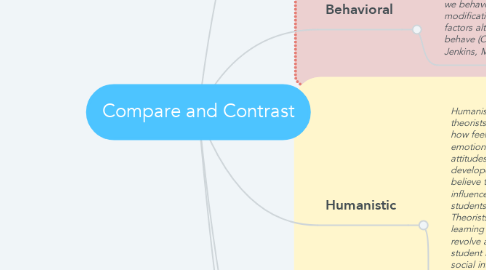Compare and Contrast
by tierra gonzales

1. Behavioral
1.1. Behavioral theorists study the way environmental factors influence the way we behave, and how modifications in those factors alter the way we behave (Cruickshank, Jenkins, Metcalf, 2016).
2. Cognitive
2.1. Cognitive theorists study the way people take in information, and process information. It is believed to influence learning because it is the way people's brains think and what goes on in their heads when they are presented information (Cruickshank, Jenkins, Metcalf, 2016).
3. Humanistic
3.1. Humanistic theorists look at how feelings, emotions, and attitudes are developed and believe that they influence the way students learn. Theorists believe learning should revolve around student interest and social interactions (Cruickshank, Jenkins, Metcalf, 2016).
4. Compare
4.1. Cognitive and behavioral theories are similar in that they both study behavior and influences on learning through a scientific approach (Cruickshank, Jenkins, Metcalf, 2016).
4.2. Behaviorism and cognitive theories are criticized, but they have substantial evidence for being useful. Many teachers use this approach, especially in the Special Education setting such as using reinforcement and intervention (Cruickshank, Jenkins, Metcalf, 2016).
4.3. Cognitive theory has led to the discovery of many of the processes that we use to think and retain information. Discoveries about long and short term memories and how people turn it into useful information has been further explained from this theory (Cruickshank, Jenkins, Metcalf, 2016).
5. Contrast
5.1. Humanism differs from behaviorism and cognitive theory in that it rejects the scientific study of behavior. It relies on individualism and personal experience, and cannot be determined by science (Cruickshank, Jenkins, Metcalf, 2016).
5.2. Behaviorists look at operant and classical conditioning to study why people act the way they do, while humanism looks at the individual and their attitudes to explain why people do what they do. Behaviorism can be changed by environmental modification, while humanism is internal and self driven.
5.3. References
5.4. Metcalf, K. K., Cruickshank, D. R., & Jenkins, D. B. (2016). The Act of Teaching. Dubuque, IA: Kendall Hunt.


